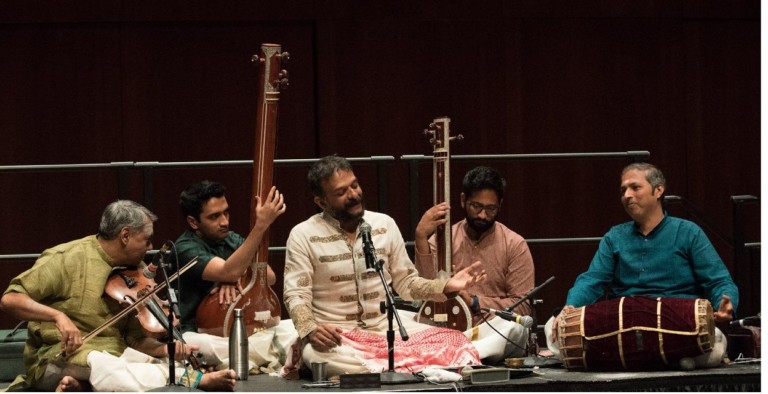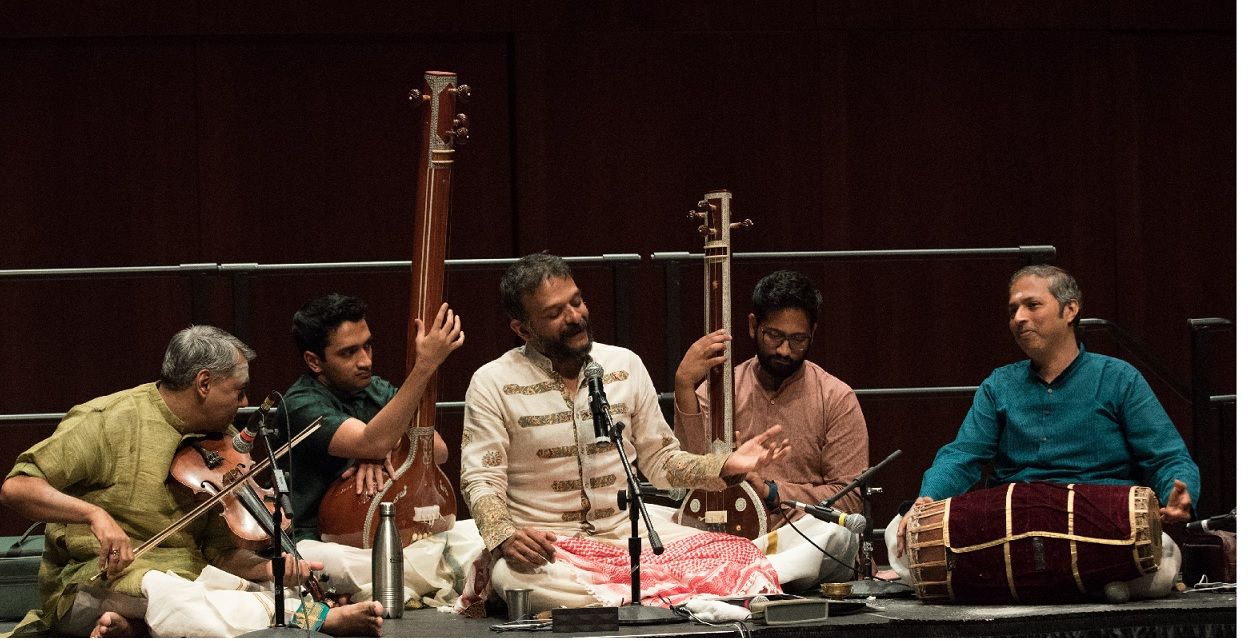 Sunthar Visuvalingam & Elizabeth Chalier
Sunthar Visuvalingam & Elizabeth Chalier
CHICAGO: TM Krishna gave a Carnatic vocal recital October 14 at Logan Center for the Arts, University of Chicago to inaugurate its “Music Without Boundaries” concert series that will feature world music. What was so remarkable from a socio-political perspective is that this acknowledged maestro not only transgressed the established performative norms of his privileged art-form but subversively channeled our aesthetic enjoyment of his virtuosity against the Brahmanical tradition that he otherwise embodies.
Before the concert, the classical iconoclast was interviewed by UC professor of music Anna Schultz. The core elements of Carnatic music, he stated, are raga (melodic form), rhythm (tala, or rather, laya) and text, which stand in a triangular relation to form the varying basis of innovation, with the musician finding his creativity at their center. “We need to dig beneath its restrictive outer form going back only 80 years—still conditioned by shared Brahmin values and identity—to discover its musical essence that needs to be reflected in other and new ways to embrace communities that have been hitherto excluded.”
He recounted his collaboration over the last two years with transgender Jogappa Abhang singers, who inhabit the border towns of Maharashtra, Karnataka and Andhra Pradesh, despite his initial queasiness at having his gender identity implicitly questioned by sharing the same stage as equal partners.
Breaking with his immediate forbears, he insisted that meaning should be subordinated to the musical flow of the syllables that constitute the text. He gave the example of an accomplished singer, who had sung the lyrics for musical effect such that it sounded as if “Lord Rama is a slave to lustful infatuation.”
He began the concert with a piece in raga Begada that celebrates woman’s ownership of her own sexuality to be freely enjoyed with whomsoever she pleases, without being stuck to any one lover. Though composed by a man, it was sung in public by vocalists of devadasi (temple-courtesan) ancestry.
This summer, when veteran vocalist OS Arun advertised a concert of Christian hymns in Carnatic style, social media erupted, calling him a traitor to his Hindu faith, forcing him to cancel the concert. In response, Krishna now makes it a point to sing at least one song every month to Jesus and Allah respectively. Having received Sanskrit poems penned by an inclusivist Hindu to mark the advent of Christmas, he sang one in a garland of ragas to celebrate the dispassionate Son of God who assumed the sins of the world. He topped this with KJ Yesudas’ prayer in Ananda Bhairavi to Allah, lyrics of which were entirely in Arabic.
Then followed a composition in Jayamanohari by saintly Thyagaraja—whom TM Krishna often takes to task for confining his prolific output to (Hindu) bhakti—critiquing (Vedic) animal sacrifice. Untouchable Kannada saint Kanakadasa’s plea in raga Devagandharito Udupi Krishna seems vindicated, because his intense bhakti to this otherwise inaccessible Brahmanical god was directed against caste-discrimination.
Persecuted even legally at state level, Perumal Murugan, contemporary Tamil novelist, was hounded by Hindu (caste) groups for ‘offensive’ depiction of ritual sexual license at Tiruchengode temple, where Shiva is in androgynous form. After his rehabilitation by the Madras High Court, Murugan—who had declared himself “dead” on Facebook for disowning his literary creation—penned colloquial poems describing his solitary despair.
Krishna rendered one of his friend’s lamentations with moving poignancy. Composed of nonsensical syllables, the traditional tillana that followed drove home Krishna’s well-known insistence that meaning is subsidiary to melody, rhythm and aesthetics in Carnatic music.
Meerabai’s famous song “pada-ghunguru bandh” served to highlight the woman’s plight, drinking deeply from the poisoned chalice of Hindu patriarchy. Pausing to introduce his violin and percussion accompanists – RK Shriram Kumar and K Arun Prakash respectively – Krishna, who made his stage debut on Oct. 12, 1988, recounted how they have been comrades-in-arms from the beginning. While Prakash breaks “every accepted norm as to how mridangam should accompany Carnatic music,” composer Shriram Kumar “protests” by challenging prevailing notions of its history through lecture demonstrations.
To show how the founding fathers were less bound by latter-day socio-cultural prejudices that erect unnecessary barriers to cross-cultural symbioses, Krishna ended with a lilting ‘pub-worthy’ melody that Muttuswami Dikshitar had spontaneously regurgitated—in his own “sacred” idiom as a Sanskrit ode to the goddess—upon encountering a British band: music should unite rather than divide us, he declared.
Iconoclast-maestro TM Krishna, accomplished disciple of the illustrious Semmangudi Srinivasa Iyer, has probably done more than any other Carnatic vocalist to render its sophisticated aesthetics and improvisational possibilities accessible to a global audience, including communities that have been hitherto excluded by its sociocultural embedding. Judging by the audience response, this would-be “protest” suggested, perhaps unwittingly, that the will to universalize its experience has been there all along not just around the margins of “classical” expression but at the very heart of its enjoyment.







